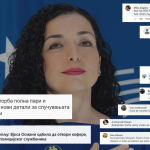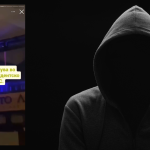Photo by Volodymyr Hryshchenko on Unsplash
Throughout the month of April, the RDN monitoring team, including the input of Innovative Media team from the project Reporting Diversity Network – The New Agenda has detected a range of hateful narratives and discourse. This month, we have seen hatred based on gender, ethnicity, and hatred against journalists.
Femicide in Kosovo
In Kosovo, two femicides took place in the month of April over a period of less than a week. At the premises of the Social Work Center in Ferizaj, a 21-year-old woman was murdered, and her 15-year-old brother was shot and injured, allegedly by her ex-husband. He was remanded in custody shortly after. Only four days later another femicide occurred in Peja where a man was arrested under suspicion of murdering his wife. According to the Basic Prosecutor’s Office in Peja, two years ago he was found guilty of domestic violence and charged with a fine and three months in prison, which he avoided by paying the fine.
In response, protests were organised in Ferizaj and Pristina. The demonstrations, organised by the Collective for Feminist Thought and Action, underscored demands for increased safety measures for women, condemning the patriarchal structures contributing to such tragedies. Participants could be seen carrying banners with the messages: “Safety for girls and women” and “Our enemy is the patriarchy”.
Kosovo’s officials and political leaders condemned the murder. Minister of Justice Albulena Haxhiu convened a meeting with key officials, acknowledging the gravity of the situation. “Despite the dedication, the measures undertaken, the campaigns initiated with the aim of gender equality, murders against women continue,” Haxhiu stated. “Violators have often become murderers precisely because of the lack of adequate punishment by the relevant institutions.” President Vjosa Osmani echoed these sentiments, emphasising the urgent need to halt femicide. The Collective for Feminist Thought and Action (Kolektivi për Mendim dhe Veprim Feminist) issued a statement, highlighting the systemic failures that leave women vulnerable to violence and advocating for a unified societal effort to combat the pervasive influence of patriarchy. They urged the government to prioritise the issue of femicide as a national emergency, emphasising the urgent need for systemic change to ensure the safety and security of all women in Kosovo.
Amidst these developments, the International Forum for Women Peace and Security commenced in Pristina. However, outside the venue, protesters voiced frustration, urging immediate action rather than conferences to take place. Activists from the Collective for Feminist Thought and Action claim to have been denied entry, with police citing their presence posed “a security risk” and could harm Kosovo’s image.
President Vjosa Osmani declared April 17 as a National Day of Mourning, saying “our society will mourn every day as long as our women and girls are being murdered”.
Some media published sensationalist headlines and information that was not in the interest of the public. On the social networks of these media, one could read comments using misogynistic narratives that blame the victims. It is important to note that the media violated the code of ethics less in the case of the murder in Ferizaj, because the close relatives refused to give statements to the media.
Nevertheless, instead of delving deeply into all the details of a specific case of gender-based violence, the media must focus on institutional responses or lack thereof. An important role of the media lies not only in holding relevant institutions accountable, but also in ethical and professional reporting on cases of femicide as well as educating the public about the broader underlying societal issues around gender-based violence.
Between 2010 and April 2024, 57 women were killed in Kosovo. Within five years (2019-2023), the number of women victims of domestic violence increased by 33.1%. In 2023, 2,375 out of 2,749 perpetrators of domestic violence in Kosovo were men.
Hatred aimed towards journalists in Albania
In Albania, a coordinated cyber-attack on the nonprofit and independent media outlet, Citizens Channel, by unknown perpetrators raised fresh concerns about media freedom and access to independent information. Citizens Channel is financed by donors with no ties to local businesses. It is widely regarded as reputable, with reporting mostly focused on human rights, public spaces, environmental issues, and the use of public funds.
Following the removal of its posts on Facebook as “spam content” in what was allegedly a coordinated effort, Citizens Channel experienced a cyber-attack on its website, suspected to be a Distributed Denial-of-Service (DDoS) attack. Lorin Kadiu, the director of Citizens Channel, reported that, “The first 10 posts were removed from the Facebook platform on Tuesday evening…and [then] some articles about the occupation of public space by construction companies, etc.” He continued, “The next day, this escalated with the removal of hundreds of posts, which practically removed about 80-90 percent of the content we have on Facebook, leaving very little behind. In addition, we faced an intensified attack on the web, leading us to believe that the attack was coordinated.”
The Safe Journalists Network emphasised that these attacks not only infringe upon Citizens Channel’s rights to report and inform but also instil fear among other media outlets and journalists, potentially stifling investigative journalism and critical reporting in Albania.
Since March 2024 the website of Citizens Channel, as the outlet reports, has been a target of attempted distributed denial-of-service (DDoS) attacks. These attacks resulted from Citizens Channel’s reporting on issues of public interest, including the construction of the National Theater and the granting of permits for skyscraper constructions by the municipality of Tirana. The articles highlighted how construction companies are occupying public land without proper authorisation or taxes. Other content included reports on the abuse of natural resources and the resistance of communities in Thirre (Mirdita) and Zall Gjocaj (Mat) against the destruction of nature.
It’s deeply concerning to witness a “digital army” spearheading a concerted campaign against Citizens Channel, specifically targeting articles dating back to 2021. This calculated effort aims to dismantle their platform, directly eroding their digital presence, outreach efforts, and rapport with their audience.
Ethnic discrimination and denial of genocide in Bosnia and Herzegovina
An announcement that the draft Resolution on the genocide committed in Srebrenica would be on the agenda of the United Nations General Assembly on May 2 resulted in various statement by officials from Republika Srpska, denying the genocide that took place and spreading hatred.
The proposed UN Resolution on Srebrenica advocates for designating July 11 as the International Day of Remembrance of the genocide in this city. It calls for unequivocal condemnation of any denial of the genocide and urges UN member states to safeguard established facts through their educational systems. Additionally, the resolution encourages the development of programmes aimed at preventing revisionism and future genocides. Notably, the document does not directly address the Serbian people or emphasise collective responsibility.
In response to this, on April 18, the National Assembly of Republika Srpska (NSRS) unanimously adopted the Final Report of the Independent Commission of Inquiry on the Suffering of All Peoples in the Srebrenica Region between 1992-1995, which was formed by the government of Republika Srpska. The report included 12 conclusions which outlined that the term genocide is incorrect and unacceptable.
Around the same time, Republika Srpska President Milorad Dodik denied the genocide in Srebrenica for two days in a row. “The genocide in Srebrenica did not happen, and if it had happened, this story would not have been imposed so much,” Dodik said, among other things, in a statement dated April 15. That statement came after he announced a “Srpska calls you” rally in Banja Luka on Thursday, April 18, in response to the announcement of the adoption of the Resolution on Srebrenica in the UN General Assembly. The rally was organised by the ruling SNSD party in Republika Srpska (Alliance of Independent Social Democrats) and partner parties. Tens of thousands of people attended the rally including party and state officials of Republika Srpska and Serbia. This event was broadcast live for several hours on national frequency channels in Serbia and Republika Srpska, including public service channels. Many speakers used harmful language, including inflammatory speech and harmful narratives. Several weeks of discussion and media reporting on the UN resolution on the genocide in Srebrenica included constant genocide denial, historical revisionism, and harmful narratives claiming that this resolution aims to label the Serbian people as a genocidal nation.
Dodik also denied genocide on April 16, saying that “in order for someone to commit genocide, there must be an intention to biologically destroy an ethnic group. And that did not happen in Srebrenica”. The mayor of Banja Luka, Draško Stanivuković, in a separate statement from April 16, denied the genocide and announced his arrival at the “big meeting”. “I am sure and I know that the representatives of the PDP (Party of Democratic Progress) will support this report, which is true, that a genocide did not happen in Srebrenica and that we are not the people they want to label us as and that we will all respond to a large gathering of support”, Stanivuković said.
Former High Representative in Bosnia and Herzegovina Valentin Inzko, using the Bonn powers, imposed changes to the Criminal Code in July 2021. Denial of genocide and glorification of war criminals is prohibited in Bosnia and Herzegovina. This criminal offense carries a sentence of six months to five years in prison. The biggest denier of the genocide in Srebrenica, according to research by the Srebrenica Memorial Center from last year, is Milorad Dodik, who denied the genocide 11 times in different ways during the past year.
Sexism and undermining of gender equality efforts in Montenegro and North Macedonia
In Montenegro, artistic director of the Nikšić Theater Janko Jelić recently refused to allow a play called “IzloŽene” (Exposed) by the independent theatre group BUNT scena (Rebellion) to be performed at the theatre. The play focuses on gender inequality and violence against women.
Jelić’s justification for refusing the play was that the topic to be discussed is “worn out” and represents “engaged propaganda”. He claimed to believe that “women are the ones who discriminate”. The decision was condemned in Montenegro by numerous people including Sandra Vujović, founder of BUNT scena and leading author of the play, who labelled the decision as a “scandal”. Minister of Culture Tamara Vujović expressed her surprise at Jelić’s decision. Furthermore, the government’s Operational team for the fight against domestic violence and violence against women commented that this decision was indeed a ‘slap’ for victims of domestic violence. Additionally, the Royal Theater “Zetski dom” from Cetinje cancelled its cooperation with the theater.
The president of the local government, Marko Kovačević, later announced that the Municipality of Nikšić will facilitate and sponsor the performance of the play in the Nikšić Theater. He said that the public controversy that has arisen on this issue, regardless of different attitudes, is useful for the problem as it raises awareness. “And the play itself will now get publicity that it might not have had if things had gone differently,” Kovačević added.
Gender inequality and violence against women is unfortunately a reality across the world. Addressing these issues requires unwavering commitment to education and information dissemination, empowering individuals with the knowledge and awareness necessary to challenge discriminatory norms and advocate for change. By shedding light on the pervasive nature of gender-based violence and inequality, we can bring much-needed attention to these societal issues and commit to fighting such inequality whilst holding those accountable to react and respond appropriately to instances of gender violence. Jelić’s dismissal of this important topic and furthermore his comment regarding women being those that discriminate undermines the fight for equality and victims of gender violence.
In North Macedonia, Aleksandar Nikoloski, the vice-president of the VMRO-DPMNE party (The Internal Macedonian Revolutionary Organization – Democratic Party for Macedonian National Unity), and a member of parliament, made a discriminatory remark in a meeting in the municipality of Strumica, within the framework of the presidential elections. He said that for his party “men are men, women are women, boys are boys, girls are girls, and it is healthy for them to live in decent families, and not to conduct any kind of gender politics. Because what nature has given, no foundation, no money, no sold souls can change it”.
VMRO-DPMNE party has been spreading harmful narratives and conservative rhetoric for a long time now. They opposed the law on gender equality and connected it with transgender policies. They also share the same stance as the Macedonian Orthodox Church that is advocating against the LGBTIQ+ community. This connection and alignment between the political party that has been in opposition for seven years (one of the two major parties) with organisations and church representatives granted them voters. Due to this, they continue to spread harmful narratives among the population. This party won the general elections held in North Macedonia on May 8 and will most likely be constituting the government, as the State Election Commission published the first results indicating the convincing victory brought the party 59 MPs in the Parliament out of 120 seats total.
Comments and rhetoric like these are extremely hateful towards women and trans people. Members of political parties who have a platform should not be using it to spread hate and discriminatory rhetoric. When politicians propagate sexism, they reinforce harmful stereotypes, undermine gender equality efforts, and perpetuate discrimination, ultimately eroding trust in democratic institutions and hindering progress towards a more inclusive society.
Unethical and unprofessional reporting on a missing girl in Serbia
In Serbia, a two-year-old girl disappeared on March 26 in Banjsko Polje near Bor. After a ten-day search by the police, two employees of the public water supply company were arrested on suspicion of having murdered her. Following the news of the alleged murder of the missing girl and amid ongoing efforts to locate her body, mainstream media in Serbia sensationalised the case by unethically and unprofessionally reporting on it. This included publishing misinformation, disinformation, and purported leaked information from the ongoing investigation during the time she was missing and later when news of her murder broke.
National media outlets, tabloids, and TV channels published content created as if they were “conducting” their own unofficial investigations. The media also interviewed relatives and neighbours of the victim, publishing explicit details of the case. Reporting on the family members bordered on abuse in some cases, as was a news segment for Informer TV in front of the house of the uncle of the (at the time missing) child where journalist Jelena Rafailović was reporting. When the man said he did not want them filming his house, as it was a live programme, from the studio someone was saying “Hit him Rafa, hit him… It will be good for the share when Rafa hits him, you’ll see”.
For several days, many media outlets presented inaccurate information, guesses, misinformation, personal comments, and theories against the girl’s mother, blaming her for her child’s disappearance, saying she sold her. This indicates a harmful patriarchal pattern in which the mother is always responsible for the family and the woman is the one to blame. The media invaded the privacy of the entire family, especially of the child during the search for her, and after the news of her murder. Unethical and unprofessional reporting on the disappearance and alleged murder of the child was also on social media, with users sharing their opinions on “what happened” with the girl during an ongoing investigation.
The whole coverage and reporting of the incident in traditional and social media was completely insensitive and unprofessional. Journalists should adhere to the Code of Journalists of Serbia and report in a professional and ethical manner especially when covering and tackling topics as sensitive as a missing minor, presumed to be dead. It is not the role or job of the media to make assumptions, conduct investigations, or confront people in a violent manner for a headline or story. It is the role of the media to disseminate information to the public based on fact rather than to take it upon themselves to get involved in private matters which is the role of the police and relevant institutions to tackle.





